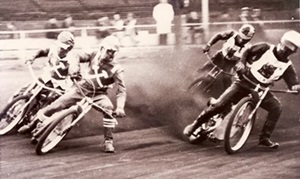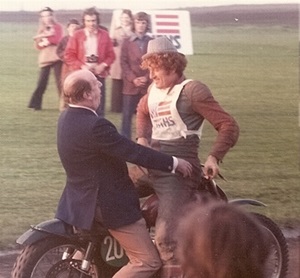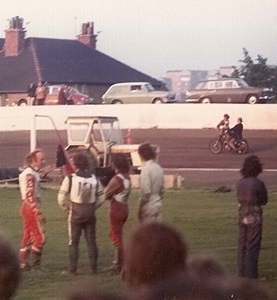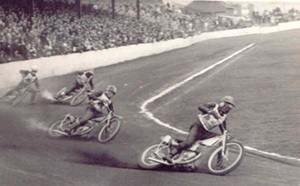
| Home | Contact Us | Articles |
| Books - DVDs | Stadia Pix | Programme Generator |
Snapshots of Yesteryear
By Peter Colvin
First featured in the Glasgow Tigers programme in 2012

The last Tuesday in April 1966 saw the Tigers at Custom House, London E16, the home of the West Ham Hammers. Before the season started, Graham Coombes had been allocated to Newcastle and a permit to sign a foreign rider should have replaced him. The Glasgow promotion had Swede Bengt Brannefors programmed to ride at number four. Frustratingly, due to a dispute with the Promoters Association, the Speedway Riders Association had refused to issue the necessary work permit and the Scottish side had to use a guest. Hence Roy Trigg of Hackney became one of a number of guests that rode for the Tigers at the beginning of the 1966 season. It proved to be a wise choice. Trigg won his first two races and the Tigers raced to a six-point lead after just five heats. Former Tiger Ken McKinlay was immediately brought in as a tactical substitute and Glasgow's lead was reduced to just two points.
This snapshot shows Malcolm Simmons leading heat four from Norman Hunter on his outside, Charlie Monk in third and Alf Wells at the rear. Monk passed the Hammers pair and Wells got by Hunter before the end of the race. With just three races remaining, the two sides were level at 30-30. Unfortunately, the next heat saw the unbeaten Roy Trigg suffering snapped forks and this helped McKinlay to continue towards a faultless 15-point maximum and a 43-35 victory for the Hammers.


In 1973, after a fourth season at Hampden Park, the promotion shocked the Glasgow fans by moving the team to Cliftonhill Park, the home of Albion Rovers football club. Then, after the Tigers finished last but one in the British League Division 1, the fans received further bad news during the winter when it was announced that their team was to race in Division 2 for the 1974 season. Many reasons could be given for the Tigers move to the Second Division, but their relative isolation did not help. Their closest rivals, geographically speaking, were Halifax. Jim McMillan had requested a transfer and with doubts about foreign rider availability, it was perhaps inevitable that the licence would go South. Hull, who had spent three seasons in the lower league, took Coatbridge's place and signed McMillan, Bobby Beaton and Dave Gifford.
The Tigers were considered one of the favourites to win the league but somehow managed to finish in mid-table with just one win away from home at Sunderland. There were many changes made in 1974. In addition to major team changes, the promotion experimented with a radical new style of programme. It was an A4 sized double sheet of poor quality paper with the race card on the back page. Because of complaints, it only lasted for six editions before being replaced with the more tradition style of programme.
Another innovation was the introduction of a Publicity Director. Archie McCulloch, writer, broadcaster, entrepreneur, entertainer, impresario and former post-war speedway announcer, was brought in to liven up the presentation. These snapshots, taken on 21st June, show Archie being taken round the track in a somewhat unconventional manner by Arthur Browning of Birmingham Brummies. In his last programme notes on 5th July, Archie McCulloch wrote that he had been nominated for the Variety Club of Great Britain and that "This must serve as a farewell message from me. I am off touring my summer show around the coast."

The first ever knock-out cup clash between Glasgow Tigers and the newly formed Edinburgh Monarchs took place in June 1948 when the two clubs met in the first round of the National Trophy. The Tigers won 116-100 on aggregate but lost both matches in the next round against the Birmingham Brummies and went out of the competition by a massive 68-point margin. This snapshot was taken almost twenty years later on 27th April 1968. It shows George Hunter winning heat 3 of the first round KO cup match at Coatbridge. Jim McMillan is in second place with Oyvind S Berg looking as though he is about to be passed by Bert Harkins. The resulting 4-2 for the home side put the Monarchs eight points ahead; a lead they were to increase over the next 15 races, winning comfortably by 24 points. There was no return match at Glasgow because the winning team was determined by a single 18-heat match.
There were a couple of notable features regarding two Monarchs riders in this match; George Hunter scored a 21-point paid maximum and a rider's unique method of showing his disgust at a refereeing decision. The colourful highlight arrived in heat 11 when Doug Templeton, disqualified when he did not get to the gate in time, laid down on the track, not allowing the race to start. Eventually he was persuaded to get up off the track and was ushered, protesting, back to the pits.
This article was first published on 24th March 2013